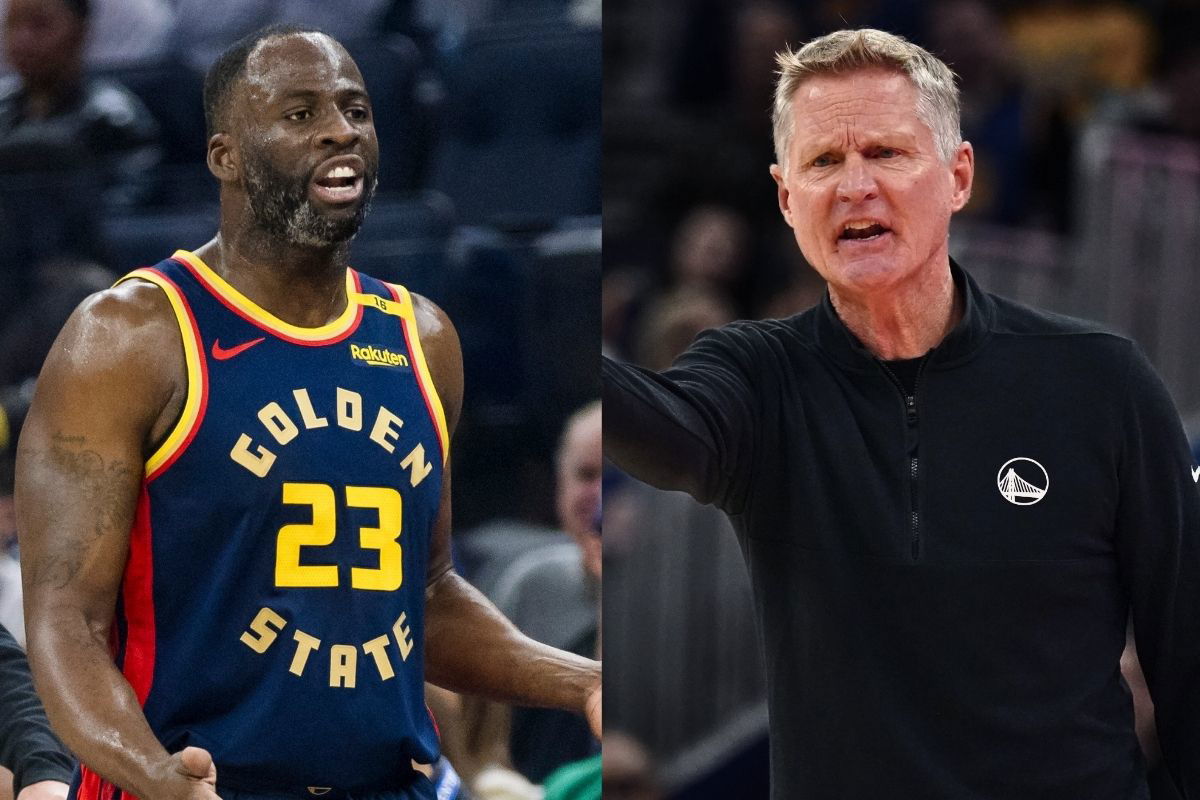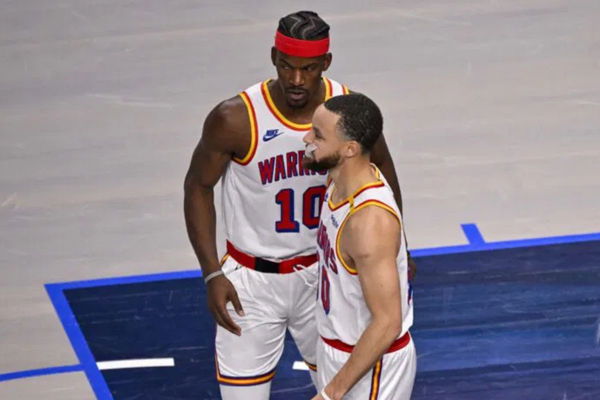
USA Today via Reuters
Image Credit: USA Today Network Via Imagn Images

USA Today via Reuters
Image Credit: USA Today Network Via Imagn Images
TNT’s Candace Parker floated a proposition with Houston up 49-24 early in the second quarter against the Warriors. She suggested that the Warriors consider pulling their starters and shifting their focus to Game 6. At first, imagining Steve Kerr waving the white flag sounded absurd. After all, this is the same coach who, during the 2019 NBA Finals, kept pushing his injury-depleted team—already missing Kevin Durant and later losing Klay Thompson mid-game—until the very last possession. Kerr has always been a believer in fighting to the end, no matter the odds. But on this occasion, caution prevailed over adventure.
Watch What’s Trending Now!
With more than 18 minutes left on the clock, Steph Curry, Jimmy Butler, and Draymond Green took their final bows for the night—not because of foul trouble, not because the game was mathematically over, but because the coaching staff and locker room leaders had decided to prioritize rest and readiness for the next one. The Rockets were leading 93-64 at that time. The Warriors’ bench rallied but couldn’t prevent the 131-116 defeat, as the series moves to Game 6.
The fact that they really got close to scare the Rockets from their bench tells you that they remain the favorites to seal the series. But was Kerr’s decision wise? How come a coach like him just decides to throw in the proverbial towel? Well, it turns out that he and veteran Draymond Green made the decision at halftime.
ADVERTISEMENT
“I wasn’t going to chase this game, obviously, with Game 6 coming up in 48 hours,” Kerr told reporters postgame. “Talked to Draymond. I said, ‘What do you think?’ He said, ‘Five minutes.’ So, we gave the starters the first five or six minutes. Unless we made a huge run, we kind of had in mind that we would pull the plug.” And that’s exactly what they did. Draymond confirmed the halftime calculation
“Yo, I don’t think we should chase it,” he recalled. “We’ll give it five, six minutes. If we can’t turn it fast, pull the plug.” This wasn’t tactical. It was philosophical. It was Kerr and Green, the heartbeat of a franchise built on competitive fire, opting to protect the future rather than contest the present. And that’s what made it feel, to many, like a blunder, because then the bench made it interesting.
Golden State’s third unit—led by Moses Moody and Kevin Knox—slashed the Rockets’ lead down to 15 in the fourth. Ime Udoka reinserted his starters. Kerr didn’t budge. And what felt like a strategic timeout started to look more like a missed opportunity. So, did the Warriors stand a chance if they had kept their stars on the court? Well, it wasn’t that easy.
ADVERTISEMENT
Houston unleashed a double-big zone defense anchored by Steven Adams and Alperen Şengün, which stifled the Warriors’ offense. Golden State’s usual fluid ball movement faltered, with stars Stephen Curry and Jimmy Butler held scoreless until the second quarter. Curry managed only 13 points on 4-of-12 shooting, while Butler added a mere 8 points on 2-of-10 attempts.
Offensively, the Rockets were relentless, shooting 64% in the first quarter and building a lead that swelled to 31 points. Fred VanVleet led with 26 points, supported by Amen Thompson’s 25 and Dillon Brooks’ 24. Hence, Steve Kerr has a lot to think about before Game 6 and he might have handed the momentum to Houston.
ADVERTISEMENT
Kerr’s call was calculated—But did he misread the pulse?
If the first half of Game 5 was an unraveling, the second half became a case study in leadership—how it’s exercised, when it’s withheld, and what it signals. Steve Kerr’s choice to bench his starters wasn’t just rare—it revealed a subtle but seismic shift in the Warriors’ identity: a team that once dared every improbable comeback now deals in margins, matchups, and managed risk.
The decision wasn’t made in panic. It was made with clarity. And that’s precisely why it stung. Not just because Steph Curry and Jimmy Butler never checked back in. But their absence spoke volumes.
ADVERTISEMENT
Golden State has long thrived on irrational confidence. This is the same franchise that once turned a 3–1 Finals deficit into a near-dynasty, that launched from 30 feet before it was popular. Game 5 felt like a departure from that spirit. It wasn’t just that the Warriors folded—it was that they folded with time on the clock and stars on the bench.
Top Stories
NBA Announces Emergency Meeting With Cavs After Luka Doncic Injury: 3 Potential Fixes for Raised Court

“Deserve Less Money”: Caitlin Clark, Angel Reese Rivalry Drives Strong WNBA Stance From Ex-Volleyball Player

Steve Kerr Issues Message for Locker Room as Warriors Put 14 Players On Trade Block

Ex-ESPN Anchor Calls Out a Hidden Caitlin Clark Problem Few Are Acknowledging

Ayesha Curry Makes a Plea for Children Suffering in Gaza As Public Donates $2,100,415 for Humanitarian Cause

Kerr pointed to the math: “I think at halftime, their effective field-goal percentage was 95%. I’ve never seen that in my life. You’re not winning that game.” Maybe not. But the decision to sit Curry and Butler while the bench cut the deficit sent an unmistakable message—not just to fans, but to the Rockets. Houston re-engaged.
This wasn’t unfamiliar ground for Kerr. In the 2016 Finals, he clung to his rotation while Barnes misfired and Cleveland roared back. Last spring, he held back timeouts as the Lakers overwhelmed his squad in Game 3. The common thread? A faith in system over situation.
ADVERTISEMENT
But playoff basketball punishes principles that ignore context. The Warriors didn’t need an identity check—they needed disruption. Instead, they opted for stability.
That’s where the loss takes on greater weight. It revealed a team not just grappling with execution, but with urgency. All season, the Warriors have flirted with preventable chaos. Against the Spurs, they blew a fourth-quarter lead that cost them the sixth seed. Now, they’ve ceded playoff momentum not because they were outplayed, but because they out-thought themselves.

Imago
Feb 12, 2025; Dallas, Texas, USA; Golden State Warriors forward Jimmy Butler (10) and guard Stephen Curry (30) during the game between the Dallas Mavericks and the Golden State Warriors at the American Airlines Center. Mandatory Credit: Jerome Miron-Imagn Images
And here’s the irony: Kerr’s conservatism, meant to preserve energy, may have drained belief. In the playoffs, momentum isn’t a bonus—it’s a weapon. And Golden State might’ve just handed it over.
ADVERTISEMENT
Now, with Game 6 looming, they face more than a basketball test. They face a reckoning with their own patterns. This wasn’t just a one-game error—it was emblematic of a season where urgency arrived late. Just like the blown opportunity against the Spurs, where a win could’ve secured the sixth seed and avoided the Play-In altogether, this too was a moment where Golden State had control—and let it slip.
Twice now, they’ve been in a position to write their own postseason script. Twice, they chose to wait.
ADVERTISEMENT
If they fall short again, this won’t just be a strategic error—it’ll be a reflection.
ADVERTISEMENT
ADVERTISEMENT
ADVERTISEMENT